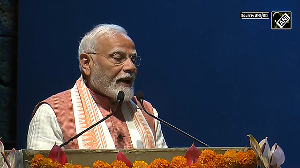If his predecessor, the Australian Malcolm Gray, came in at a time when corruption was threatening to tear the game apart, Pakistan's Ehsaan Mani picks up the mantle with the contracts controversy, chucking, and the cancellation of tours threatening to blow up in the ICC's face.
 Speaking to select Indian journalists through a teleconference on Thursday evening, Mani gave a glimpse of his personality that has helped him climb up the ICC ladder from being a representative of Pakistan to head of the organisation.
Speaking to select Indian journalists through a teleconference on Thursday evening, Mani gave a glimpse of his personality that has helped him climb up the ICC ladder from being a representative of Pakistan to head of the organisation.
He diplomatically termed the East-West divide in the ICC a manifestation of the "rich diversity of cultures" existing in the organisation and politely blamed the Board of Control for Cricket in India for the contracts mess.
Mani pointed out that all member boards had approved the ICC's draft player contract without any objections.
Last December, at the height of the row, the ICC released details of the contract signed by the BCCI to contradict Jagmohan Dalmiya's claims that he was unaware of certain clauses.
"What happened was that the ICC entered into a contract with the GCC and had certain obligations towards them, which nine nations agreed to honour. One country had problems with them," he said simply.
Mani said the Global Cricket Corporation's claims would have to be settled amicably. "They are our commercial partners, not our enemies," he pointed out. "We have the same goal in front of us, to settle the claims, and we will do so."
In his long association with the ICC, Mani, a chartered accountant by training, has served on several committees -- the chairman's advisory committee, the rules review panel, the governance and organisation committee, and the finance and marketing committee, which he headed as chairman and in which capacity he played a major role in the sale of the ICC's media rights in 2000, a deal that guaranteed the ICC an income of $550 million (£329m) until the 2007 World Cup. Given this, he is probably one of the best individuals in the organisation now to resolve the dispute with the GCC.
In his role as ICC chief, however, Mani will have to forgo his interest in the Asian Cricket Council, a body that was set up 15 years ago to promote the interests of Asian cricket playing countries and which he has served for several years.
"The sole purpose of the ACC was to raise the level of the sport in Asia, since India and Pakistan were not winning too much," Mani clarified. "The ICC at that time did not have the global resources and therefore the ACC was working towards development of the sport. It was not to take on the ICC at all."
Mani said his home country Pakistan had suffered a lot on account of tours getting cancelled last year on account of politics (India) and security issues (Australia, New Zealand, West Indies). Pakistan Cricket Board president General Tauqir Zia had even asked the ICC to compensate him for the cancelled tours.
But Mani made it clear that the ICC could not pay any such compensation. "I have worked closely with the Pakistan Cricket Board and know the difficulties they have faced," he said. "But the only way to compensate a country is to give them more cricket. ICC does not have the resources to pay the country."
The ICC had earlier said that in case the tours don't go ahead the PCB would be given huge dividends from the ICC funds. "But New Zealand has promised to go to Pakistan after the India tour; Bangladesh and South Africa will also tour the country. So things are looking good," he said.
Interestingly, Mani, as a member of the rules review committee of the ICC back in the 1990s, had got tough on short-pitched bowling and was instrumental in pushing the one-bouncer-per-over rule in Test cricket at a time when Pakistan was thriving on fast bowlers.
"I was not alone," Mani explained. "Respected people like [the late ICC president] Colin Cowdrey and a couple of players from Pakistan met and agreed on clamping down on short-pitch bowling. There was too much short-pitched bowling. In an over 3-4 balls were bouncers, giving no scoring opportunities to the batsmen. The game was getting boring; the safety of the players was at stake. We were just trying to get the balance right."
Mani does not think the rule has made cricket even more of a batsman's game. "Not many games last all five days anymore," he pointed out. "That should tell you something."
Mani shares the vision of his predecessors at the ICC (Gray and Dalmiya) of globalising the game and believes it is important to take the game to new territories. One of his priorities will, therefore, be taking the sport to the United States when the World Cup travels to the West Indies in 2007. "We are discussing staging some games in the US," he said, "but it is not a done deal yet."
"At the same time," he continued, "we need to help ICC members Kenya and Bangladesh. Kenya's performance in the World Cup was exciting, but the step-up from the one-day game to Test cricket is a huge and difficult one. [And] over the next two years there may be a reduction in the amount of international cricket Bangladesh is playing, particularly outside Bangladesh."
But chucking remains a contentious issue. Despite the ICC's decision to review its current procedure of dealing with illegal bowling actions, almost every Test team has a bowler with a suspect action. Outgoing ICC chief Gray had told rediff.com in an interview, "I am not happy with the whole matter of illegal deliveries. I think there is a problem."
Gray's view was that people with suspect actions should not be allowed to rise to the international level in the first place. The trouble ought to be nipped at the grassroots level itself. But local administrators tend to protect their people. "Even when you get into international teams, if they have been very successful, their national administrators don't like taking action because it affects the results of the team," he admitted. "So it's more than just what is the process of the ICC to deal with a man at the international level."
Currently, players with suspect actions who are reported to the ICC are first referred back to their home country association for corrective action. Only if they are reported again thereafter are they referred to the ICC's panel of experts. The review is likely to do away with the first step and send such bowlers directly to the ICC's expert panel.







 © 2025
© 2025